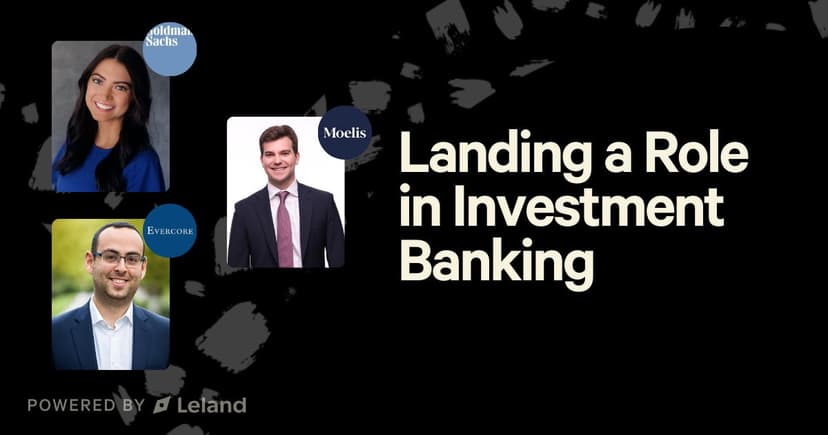Top 10 Questions to Ask in an Investment Banking Interview
Discover the top 10 investment banking interview questions to ask recruiters. Show genuine interest, stand out from other candidates, and gain insight into the finance industry and your future career path.
Posted August 28, 2025

Join a free event
Learn from top coaches and industry experts in live, interactive sessions you can join for free.
Table of Contents
Questions to Ask in an Investment Banking Interview
In an investment banking interview, the questions you ask can be just as revealing as your answers. Thoughtful, firm-specific questions show genuine interest, strong interview preparation, and awareness of the finance industry. Instead of repeating generic “why our bank” lines, focus on what really matters – whether it’s how a team handles deal flow, balances a busy schedule, or what the most valuable lessons are for a new team member.
Smart investment banking interview questions also highlight your technical awareness, from financial modeling and DCF analysis to understanding a cash flow statement or capital structure. Asking about training, exposure to enterprise value, or how the group compares to larger banks shows you’re ready to hit the ground running. With that in mind, here are the 10 best questions to ask in a banking interview.
1. How does this team fit within the bank’s overall business units?
Asking this in an investment banking interview shows you understand that a bank’s success isn’t just about individual deals but about how different business units – from investment banking and commercial banking to private equity advisory and wealth management – work together. Candidates who frame interviewer questions this way demonstrate that they see the bigger picture of the finance industry, how deal flow connects across divisions, and how company’s assets, financial statements, and capital structure are supported by multiple teams.
Why recruiters like this:
- Goes beyond memorization: Shows you’re not just repeating sample answers or drilling technical questions like a DCF analysis or calculating enterprise value.
- Firm connection: Demonstrates that you can link background information about the bank to your own career path.
- Curiosity about collaboration: Signals interest in how teams work together and in cross-functional strategy.
- Applied skills: Proves you can use your analytical skills in real life scenarios, not just on paper.
- Prepared to contribute: Indicates you’re ready to hit the ground running as a new team member.
Long-term focus: Highlights that you value strategic understanding as an important factor for long-term success, not just short-term prestige.
2. What sets your group apart from other teams or competitors like Goldman Sachs or J.P. Morgan?
This is one of the smartest investment banking interview questions because it shows you’re thinking beyond the basics and digging into how the group positions itself within the finance industry. By asking about differentiation, you signal genuine curiosity about what makes this team distinct – whether it’s unique deal flow, specialized coverage of similar companies, or expertise in navigating volatile market conditions.
Recruiters recognize that you’re not just recycling generic lines like “why our bank,” but instead doing focused interview preparation tied to the firm’s real business units and strengths. Asking this question gives you insight into the team’s reputation and culture – helping you assess whether this is the right career path and if you’ll thrive as a new team member.
Why recruiters like this:
- Differentiation mindset: Shows you’re focused on what truly sets the firm apart, not just prestige.
- Strong preparation: Signals you’ve done a detailed analysis of the firm’s positioning in the financial sector.
- Competitive awareness: Demonstrates that you understand the landscape and can compare across larger banks.
- Culture fit: Highlights your curiosity about the group’s reputation and how it develops young talent.
- Applied thinking: Connects firm strategy to your own career path and professional growth.
- Long-term orientation: Proves you’re evaluating not just the job, but where you can succeed and contribute over time.
3. Can you tell me about a recent deal the team worked on?
This is one of the most practical investment banking interview questions because it directly connects your interview preparation to real-world activity in the financial markets. By asking about a recent deal, you demonstrate genuine interest in how the team operates day to day and your awareness of the types of transactions that drive the firm’s deal flow. It shows that you’re not only studying technicals like the cash flow statement, DCF analysis, or enterprise value, but also paying attention to how these concepts apply to real life companies and transactions.
Referencing a transaction you’ve read about in the Wall Street Journal or Financial Times adds credibility, as it proves you’re staying up to date with current affairs in the finance industry. Following up with thoughtful interviewer questions about the team’s role in the deal, challenges faced in volatile market conditions, or how they structured the capital and managed risk can give you valuable insights into the group’s expertise. It also signals that you’re curious about how your future analytical skills – from building financial models to preparing company financial statements – could contribute to similar projects as a new team member.
Why recruiters like this:
- Real-world focus: Shows you can connect technical knowledge to live deals in the finance industry.
- Market awareness: Demonstrates you’re following deal activity through sources like the Wall Street Journal or Financial Times.
- Preparation signal: Indicates strong interview preparation and genuine interest in the group’s work.
- Analytical mindset: Connects classroom or prior financial modeling experience to actual company transactions.
- Engagement: Encourages conversation about the team’s track record and culture.
Career alignment: Helps recruiters see that you understand the role of deals in shaping your career path and growth.
4. What qualities do successful analysts at Morgan Stanley, Goldman Sachs, or other firms typically share?
Asking this in an investment banking interview positions you as someone eager to model success and learn from those who have thrived in the role. Instead of focusing only on technical skills like building a DCF analysis or interpreting a cash flow statement, this question digs into the habits, work ethic, and mindset that help analysts succeed at top firms such as Morgan Stanley, Goldman Sachs, and J.P. Morgan. It also shows humility – you recognize that beyond mastering financial modeling and the income statement, there are intangible traits like resilience, attention to detail, and the ability to manage a busy schedule while still producing high-quality work.
Investment bankers and recruiters appreciate this type of interviewer question because it reflects both curiosity and self-awareness. They know that successful analysts combine strong analytical skills with adaptability in real life situations, whether handling long hours, responding to last-minute changes in financial statements, or contributing to the team during complex deals. By asking this, you’re signaling that you want to learn from role models, avoid common mistakes, and develop into an ideal team member who can hit the ground running.
Why recruiters like this:
- Self-awareness: Shows you know that success isn’t just about technical mastery, but also personal growth.
- Career focus: Positions you as someone serious about building a long-term career path in the finance industry.
- Analytical readiness: Signals you’re ready to apply analytical abilities to both numbers and professional development.
- Learning mindset: Demonstrates curiosity to learn from past experiences of other analysts.
- Culture fit: Suggests you value teamwork, resilience, and alignment with the firm’s core values.
- Practical application: Connects technical knowledge with the behaviors needed to succeed in real life banking scenarios.
5. How does the firm approach risk management in volatile market conditions?
This is one of the most insightful investment banking interview questions because it demonstrates that you understand the realities of the financial sector and the constant impact of market dynamics. By asking about risk management, you show recruiters that you’re thinking about more than just building a DCF analysis or interpreting a cash flow statement – you’re interested in how the firm protects clients, balances its capital structure, and makes decisions in times of uncertainty. It highlights your ability to connect technical concepts like enterprise value, interest payments, and working capital to real-world financial markets scenarios.
For investment bankers, this question invites discussion about how the team navigates volatile market conditions, manages potential risks, and still drives deal flow. It gives you an inside look at how the bank applies analytical skills under pressure, maintains its company’s financial health, and ensures that company’s assets and cash flows are safeguarded. Asking about this not only reflects strong interview preparation but also helps you evaluate whether the firm’s approach to risk and resilience aligns with your own career path and personal values.
Why recruiters like this:
- Realism: Shows awareness of challenges in the finance industry, not just textbook scenarios.
- Strategic thinking: Signals that you value long-term stability and understand risk management as an important factor for success.
- Applied knowledge: Connects financial statements and technical concepts like discounted cash flow analysis to real-world events.
- Culture awareness: Demonstrates interest in the firm’s decision-making process and overall company culture.
- Career alignment: Helps recruiters see that you’re evaluating whether the firm’s philosophy matches your goals.
- Prepared mindset: Indicates you’re ready to handle pressure, adapt in different scenarios, and contribute as a new team member.
6. What training and development opportunities exist for new analysts?
This is one of the most valuable investment banking interview questions because it highlights your focus on long-term career growth rather than just landing the job. By asking about training, you show recruiters that you’re eager to build both technical and soft skills – from mastering Excel, financial modeling, and DCF analysis to developing leadership abilities, communication, and client management. It signals that you want to go beyond memorizing financial statements or calculating enterprise value and instead become a well-rounded team member who contributes to the firm’s success across business units.
For investment bankers, this question opens the door to share details about analyst bootcamps, mentorship programs, and how new hires are introduced to real deal flow. They might also discuss exposure to tools like machine learning in financial analysis, training on capital structure, or guidance on handling a busy schedule and long hours. By asking this, you not only demonstrate strong interview preparation, but also make it clear that you value structured development, feedback, and the chance to hit the ground running as you grow into more advanced roles such as an associate position.
Why recruiters like this:
- Growth mindset: Shows you’re committed to building both technical and interpersonal skills.
- Career focus: Signals that you see the role as part of a broader career path, not just a short-term step.
- Preparedness: Demonstrates you’re already thinking about how to integrate training into your performance.
- Culture fit: Reflects alignment with firms that value mentoring, structured development, and teamwork.
- Long-term success: Indicates you want to grow into roles that require leadership, adaptability, and strategic thinking.
- Applied curiosity: Connects training programs directly to handling real financial markets and complex problems.
7. How does the team incorporate innovation, technology, or data analysis into its workflow?
Asking this during an investment banking interview shows that you have a forward-looking perspective and are tuned into how the finance industry is evolving. Banks today are increasingly using automation, machine learning, and advanced data analysis to improve efficiency, manage risk, and design smarter investment strategies. By raising this question, you show that you’re not only prepared to master traditional financial modeling and DCF analysis, but also interested in how new tools can shape deal flow, optimize capital structures, and enhance portfolio management. It connects your interview preparation to the realities of a fast-changing marketplace where technology is becoming an integral part of banking operations.
For investment bankers, this question invites them to discuss how their team integrates innovation into everyday work – whether through improved modeling of cash flows, using automation to analyze financial statements, or leveraging data-driven insights in equity value assessments and discounted cash flow analysis. It also shows that you want to learn how cutting-edge tools fit into a traditional career path, giving you an edge as a new team member who can hit the ground running.
Why recruiters like this:
- Future-focused: Demonstrates awareness of trends reshaping the financial sector.
- Technical curiosity: Connects interest in tech tools with core analytical skills like DCF analysis and enterprise value.
- Career growth: Signals you’re preparing for a long-term role where innovation plays an important factor in success.
- Firm-specific thinking: Shows you want to know how this team, not just the industry, is adapting to change.
- Value add: Suggests you’re thinking about how your skills can contribute to smarter, more efficient workflows.
Culture fit: Highlights openness to learning, adaptability, and alignment with firms that prioritize innovation.
8. How does the firm prioritize diversity, equity, and inclusion (DEI)?
This is one of the most meaningful investment banking interview questions because it reflects alignment with a firm’s core values and long-term vision. Asking about DEI shows you’re not focused solely on prestige or deal flow, but that you care about the workplace environment, mentorship opportunities, and whether you’ll be part of an inclusive team member culture. For firms like Morgan Stanley, DEI connects directly to its broader initiatives, such as sustainability, the Global Sustainable Finance Group, and commitments like achieving net zero financed emissions. By raising this question, you demonstrate genuine interview preparation and interest in how the firm builds a diverse, resilient workforce within the finance industry.
For investment bankers and recruiters, this question opens up discussion of how DEI influences hiring, training, and promotions, as well as how it shapes collaboration in business units like institutional securities or wealth management. It also gives you insight into how the bank develops talented people, manages a busy schedule across different backgrounds, and ensures that analytical skills and leadership potential are recognized regardless of identity. Asking this proves you’re evaluating the firm-specific culture as an important factor in your career path, not just looking for a brand name.
Why recruiters like this:
- Values alignment: Shows that you care about Morgan Stanley’s culture and not just prestige.
- Long-term focus: Signals that you’re evaluating whether the firm’s dedication to DEI supports sustainable career growth.
- Culture fit: Demonstrates interest in how inclusive teams handle collaboration and complex problems.
- Thoughtful preparation: Reflects that your interview questions go deeper than typical sample answers.
- Personal connection: Highlights that you want your personal values to align with the firm’s core values.
Future orientation: Indicates you see DEI as an integral part of shaping both individual success and firm-wide innovation.
9. What has been your personal experience at the firm?
This is one of the most effective investment banking interview questions because it creates space for authentic, human responses from your interviewer. Rather than focusing only on technicals like DCF analysis, the cash flow statement, or enterprise value, you’re asking the banker to reflect on their own journey – how they’ve navigated a busy schedule, what the most valuable lessons have been, and how they’ve grown as a team member. It signals that you’re interested in more than just the job; you care about understanding the culture, mentorship, and lived experiences of those already succeeding in the finance industry.
For investment bankers, this question often leads to candid stories about long hours, learning to handle complex problems, or how they advanced from an analyst to an associate position. It also opens the door to hearing positive feedback about what makes the firm a good place to work – from collaboration within business units to opportunities in financial modeling and exposure to real life deals. Asking this shows recruiters that you’re evaluating the firm as a whole – its people, culture, and growth opportunities – and that you’re looking for alignment between your personal values and the firm’s core values.
Why recruiters like this:
- Authenticity: Shows you’re seeking real insight, not just rehearsed lines.
- Relationship building: Encourages personal connection with bankers and recruiters.
- Culture awareness: Demonstrates genuine interest in Morgan Stanley’s culture or any firm’s internal environment.
- Positive energy: Allows bankers to share their most valuable lessons and positive feedback.
- Thoughtful preparation: Reflects maturity in recognizing that the career path is shaped by people as much as deals.
- Long-term perspective: Signals that you’re evaluating cultural fit as an important factor in your success.
10. What are the next steps in the interview process?
This is one of the most practical investment banking interview questions and a great way to close on a professional note. By asking about the interview process, you demonstrate organization, awareness of how structured recruiting works at larger banks, and eagerness to move forward. It shows you understand that success in the finance industry isn’t just about technical skills like DCF analysis, interpreting a balance sheet, or calculating enterprise value – it’s also about managing expectations, timelines, and communication. Recruiters interpret this question as a sign of maturity: you’re not only focused on proving your analytical skills, but also on staying aligned with the important factors of process and timing.
For investment bankers and recruiters, this question provides a natural opportunity to outline the next stages – whether it’s additional technical questions on financial statements, personal questions about leadership and teamwork, or final rounds with senior bankers. It positions you as someone ready to hit the ground running, who values clarity and efficiency in both work and communication. Ending with this ensures you leave a strong, professional impression while also getting actionable information to guide your career path forward.
Why recruiters like this:
- Professionalism: Shows maturity and seriousness about the role.
- Organization: Demonstrates that you want to stay aligned with the firm’s structured interview process.
- Eagerness: Signals genuine interest in moving forward with the job.
- Practicality: Ensures both sides have clarity on what comes next.
- Confidence: Shows you’re comfortable closing the conversation with a clear, concise interview answer.
- Career focus: Highlights that you view the process as an important factor in building your long-term career path.
Work With An Expert to Prepare For Your Banking Interview
Landing an offer in investment banking takes more than polished interview answers – it requires strategy, preparation, and the ability to stand out in a competitive finance industry. Working with an experienced investment banking coach can give you the edge: from mastering technical questions like DCF analysis, enterprise value, and the cash flow statement, to refining your responses to cultural fit questions such as “why our bank.” A coach can help you anticipate the full interview process, practice with real interviewer questions, and build the confidence to hit the ground running as a new analyst or associate.
If you’re serious about securing a role and accelerating your career path, book a free intro call with one of our Investment Banking Coaches and get personalized guidance to turn your preparation into an offer.
Read more:
- Investment Banking Analysis: Financial Valuation for IB Interviews – A Beginner's Guide
- How to Answer “Why This Firm?” and “Why Investment Banking?” in Interviews
- Investment Banking Interview Guide: Process & Tips
- IB Technical Interview Guide & Questions (With Sample Answers)
What to Ask the Interviewer – FAQs
What are the most important investment banking interview questions to prepare for?
- Candidates should be ready for both technical questions and personal questions. On the technical side, this includes building a DCF analysis, calculating enterprise value, interpreting a cash flow statement, and analyzing financial statements like the income statement and balance sheet. On the personal side, expect questions like “why our bank”, your greatest weakness, or how you handled complex problems in previous jobs.
Why should I ask questions in an investment banking interview?
- Asking thoughtful interviewer questions shows genuine interest in the finance industry, strong interview preparation, and awareness of how investment bankers work across different business units. It also helps you evaluate whether the firm-specific culture aligns with your career path, beyond just prestige or long hours.
What’s the difference between technical and personal interview questions?
- Technical questions test your ability to apply analytical skills to real financial statements, such as projecting unlevered free cash flow, calculating terminal value, or assessing working capital. Personal questions explore your character and fit—things like teamwork, handling a busy schedule, or what valuable lessons you learned from a leadership role. Both categories are crucial for success.
How can I show I’m prepared in an investment banking interview?
- One way is to reference recent deals you’ve read about in the Wall Street Journal or Financial Times, and then ask firm-specific questions about strategy, culture, or capital structure. Bringing in background information and connecting it to your own skills and career goals shows you’ve gone beyond memorized sample answers and are ready to hit the ground running.
What if I don’t have a strong technical background?
- Even without prior financial modeling experience, you can still demonstrate readiness by studying the main categories of financial statements, learning how accounts receivable, retained earnings, and interest expense connect to net income and cash flows, and practicing DCF analysis. Pairing that with strong analytical abilities, curiosity, and interview preparation shows recruiters you’re serious about learning.
Should I ask about lifestyle and long hours during the interview?
- It’s better to avoid asking directly about long hours or lifestyle until you’ve advanced further in the interview process. Instead, ask questions that indirectly touch on these points, such as how analysts manage a busy schedule, what the most valuable lessons were in the first year, or how the team supports new hires. This keeps the tone professional while still giving you insight into day-to-day realities.
How can a coach help me prepare for investment banking interviews?
- An investment banking coach can walk you through both technical questions (like discounted cash flow analysis, equity value, and capital structure) and behavioral ones (like “why our bank” or teamwork scenarios). Coaches also provide mock interviews, feedback on your sample answers, and strategies for standing out in the interview process. This structured support helps you avoid common mistakes and ensures you’re prepared for every stage, from HireVue screens to final rounds with senior bankers.
























